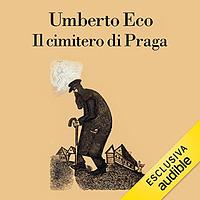Take a photo of a barcode or cover
Long slow read. didn't seem to translate well this time to my thinking
Well, nertz. I really, really wanted this to work for me. The first-person narrative, at least with this particular narrator, drives me to distraction. Sorry, Umberto. I'll keep trying. I'm hoping for another In The Name Of The Rose
Gah, finally finished. I'm struggling to describe this book, since no matter what I write it'll sound interesting and exciting, when actually it's anything but. Sorry, Mr Eco, this one wasn't for me at all.
"Es muß nicht immer Kaviar sein" in historisch, literarisch wertvoll, mit mehr Toten und weniger Sympathie für den Protagonisten.
Es ist allgemein bekannt, dass Umberto Eco ein Faible für Fälschungen hat. So werden auch die Fälschungen zu den eigentlichen Hauptfiguren im "Friedhof in Prag" - und es ist ein verworrener, spannender, etwas abgedrehter, mit einer Unmenge an historischen Informationen bereicherter Weg zwischen Realität, Fiktion und Wahn, den diese Fälschungen Simonini und/oder Dalla Piccola entlang führen. Es geht um Geheimdienste, Geheimgesellschaften, geheime Gedanken und der berühmten geheimen Leiche im Keller (oder LeicheN). Freud hat ebenso eine Nebenrolle wie Alexandre Dumas oder Garibaldi, doch der Star der Geschichte ist der unsympathische Simonini, der von Ängsten geplagt wird und sich mit Hass vor ihnen zu schützen versucht. Er vereint gleich mehrere Tabus (und anderes) in einer Person: Antisemit, Frauenhasser mit pädophilen Neigungen, psychisch Kranker, Mörder, Verräter, Lügner, Fälscher, Doppelagent,... und leidet dazu unter den verschiedensten Ängsten und Zwängen. Als Hörerin schwankte ich nahezu ständig zwischen Abscheu, Wut, Mitleid, Hoffnung auf Besserung, aber auch darauf, dass er doch damit durchkommen möge, an vielen Stellen hatte ich eine verrückte Mischung aus all diesen Gefühlen.
Es ist kein Hörbuch, das ich mal so nebenher zum Autofahren hören konnte - dafür gibt es einfach zu viele Protagonisten, historische Daten und Wendungen, die rasch nacheinander folgen und komplex miteinander verwoben sind. Und genau das macht es zu einem herausragenden, riesigen Werk, das man gerne auch ein zweites Mal hören möchte.
PS: Einen besonderen Pluspunkt bekommt das Hörbuch von mir für das Ende!
Es ist allgemein bekannt, dass Umberto Eco ein Faible für Fälschungen hat. So werden auch die Fälschungen zu den eigentlichen Hauptfiguren im "Friedhof in Prag" - und es ist ein verworrener, spannender, etwas abgedrehter, mit einer Unmenge an historischen Informationen bereicherter Weg zwischen Realität, Fiktion und Wahn, den diese Fälschungen Simonini und/oder Dalla Piccola entlang führen. Es geht um Geheimdienste, Geheimgesellschaften, geheime Gedanken und der berühmten geheimen Leiche im Keller (oder LeicheN). Freud hat ebenso eine Nebenrolle wie Alexandre Dumas oder Garibaldi, doch der Star der Geschichte ist der unsympathische Simonini, der von Ängsten geplagt wird und sich mit Hass vor ihnen zu schützen versucht. Er vereint gleich mehrere Tabus (und anderes) in einer Person: Antisemit, Frauenhasser mit pädophilen Neigungen, psychisch Kranker, Mörder, Verräter, Lügner, Fälscher, Doppelagent,... und leidet dazu unter den verschiedensten Ängsten und Zwängen. Als Hörerin schwankte ich nahezu ständig zwischen Abscheu, Wut, Mitleid, Hoffnung auf Besserung, aber auch darauf, dass er doch damit durchkommen möge, an vielen Stellen hatte ich eine verrückte Mischung aus all diesen Gefühlen.
Es ist kein Hörbuch, das ich mal so nebenher zum Autofahren hören konnte - dafür gibt es einfach zu viele Protagonisten, historische Daten und Wendungen, die rasch nacheinander folgen und komplex miteinander verwoben sind. Und genau das macht es zu einem herausragenden, riesigen Werk, das man gerne auch ein zweites Mal hören möchte.
PS: Einen besonderen Pluspunkt bekommt das Hörbuch von mir für das Ende!
“A mystic is a hysteric who has met her confessor before her doctor.”
― Umberto Eco, The Prague Cemetery

So, I dropped one star because (first) I was a little disappointed that none of the stars on Goodreads were upside-down pentagrams or hexagrams. Also (second), I left off one star because by about page 400, I was drained of all my anti-Semitic antibodies. The crazy fundamentalism, fractured insanity, and conspiracy rich shadows of anti-Jewish attitudes in Europe during the 100 years from the mid-1800s till Hitler's Final Solution just isn't easy to stomach (for me) after 400 pages. How am I going to ever read [b:The Rise and Fall of the Third Reich|767171|The Rise and Fall of the Third Reich A History of Nazi Germany|William L. Shirer|https://images.gr-assets.com/books/1331223772s/767171.jpg|1437584]? Ugh. OK, so that explains my missing star (relegated to the sewer).
Now to what I liked. First, Eco is kinda amazing. This is my second of his novels. I read Foucault's Pendulum years and years ago and love how he folds in the real with his fiction. He makes [a:Dan Brown|630|Dan Brown|https://images.gr-assets.com/authors/1399396714p2/630.jpg] seem like some half-literate child who can only read travel guides to Europe. Eco is the master of conspiracy, grey history, Jesuits, Freemasons, Carbonari, Garibaldi, Satan and international anarchism to boot. Plus he really knows food.* I disagree with Theo Tate's take on Eco using Updike as a hammer when he says that Eco's "orgy of citation and paraphrase" is unbearable. It wasn't the DETAIL that killed me, but the necessary rantings of Eco's fictional dual narrator(s). The details I quite enjoyed.
Anyway, about 100 pages into this novel and I began to see resemblances of the book's protagonist/anti-hero Simone Simonini to Mark Hofman - a famous Mormon forger and bomber. A little creepy how close in someways these two resemble each other (at least to me). It all works with one of my favorite lines of the book and probably one of Eco's main themes: "This led me to think, even then, that if I wanted to sell the story of a conspiracy, I didn't have to offer the buyer anything original, but simply something he already knew or could find out more easily in other ways. People believe only what they already know, and this is the beauty of the Universal Form of Conspiracy." Over 25 years ago Mark Hofman figured this out, when selling documents to the Mormon Church, and those who pimp conspiracy theories now most certainly know too. Don't sell someone something they don't know, sell them what they already believe ... just make sure the it smells vaguely authentic. Creativity isn't a must if you are a forger...or selling a conspiracy, just if you are Umberto Eco.
* Eco could teach [a:Jason Matthews|738142|Jason Matthews|https://images.gr-assets.com/authors/1369720119p2/738142.jpg] the art of how to delicately introduce gastronomes into a novel.
― Umberto Eco, The Prague Cemetery

So, I dropped one star because (first) I was a little disappointed that none of the stars on Goodreads were upside-down pentagrams or hexagrams. Also (second), I left off one star because by about page 400, I was drained of all my anti-Semitic antibodies. The crazy fundamentalism, fractured insanity, and conspiracy rich shadows of anti-Jewish attitudes in Europe during the 100 years from the mid-1800s till Hitler's Final Solution just isn't easy to stomach (for me) after 400 pages. How am I going to ever read [b:The Rise and Fall of the Third Reich|767171|The Rise and Fall of the Third Reich A History of Nazi Germany|William L. Shirer|https://images.gr-assets.com/books/1331223772s/767171.jpg|1437584]? Ugh. OK, so that explains my missing star (relegated to the sewer).
Now to what I liked. First, Eco is kinda amazing. This is my second of his novels. I read Foucault's Pendulum years and years ago and love how he folds in the real with his fiction. He makes [a:Dan Brown|630|Dan Brown|https://images.gr-assets.com/authors/1399396714p2/630.jpg] seem like some half-literate child who can only read travel guides to Europe. Eco is the master of conspiracy, grey history, Jesuits, Freemasons, Carbonari, Garibaldi, Satan and international anarchism to boot. Plus he really knows food.* I disagree with Theo Tate's take on Eco using Updike as a hammer when he says that Eco's "orgy of citation and paraphrase" is unbearable. It wasn't the DETAIL that killed me, but the necessary rantings of Eco's fictional dual narrator(s). The details I quite enjoyed.
Anyway, about 100 pages into this novel and I began to see resemblances of the book's protagonist/anti-hero Simone Simonini to Mark Hofman - a famous Mormon forger and bomber. A little creepy how close in someways these two resemble each other (at least to me). It all works with one of my favorite lines of the book and probably one of Eco's main themes: "This led me to think, even then, that if I wanted to sell the story of a conspiracy, I didn't have to offer the buyer anything original, but simply something he already knew or could find out more easily in other ways. People believe only what they already know, and this is the beauty of the Universal Form of Conspiracy." Over 25 years ago Mark Hofman figured this out, when selling documents to the Mormon Church, and those who pimp conspiracy theories now most certainly know too. Don't sell someone something they don't know, sell them what they already believe ... just make sure the it smells vaguely authentic. Creativity isn't a must if you are a forger...or selling a conspiracy, just if you are Umberto Eco.
* Eco could teach [a:Jason Matthews|738142|Jason Matthews|https://images.gr-assets.com/authors/1369720119p2/738142.jpg] the art of how to delicately introduce gastronomes into a novel.
Erudite or just verbose? I am not sure. This is entertaining enough, but not particularly compelling.
Eco creates a decent thriller connecting major events of the second half of Europe's political and intolerant history. It's very involved in detail and not quite bound together in grandeur, but passes as a decent impersonation of the historical novel which his Rose exemplified.
An evil, anti-Semitic doppelgänger of Forrest Gump is involved in much of the history of the late 19th century western Europe. From Garibaldi to Dreyfuss to the French Revolutions to Freud, Captain Simonini is there. I very much enjoyed the part involving the Italian wars of unification, a part of history I knew little about. The plot device of two personalities jointly writing a diary to re-establish lost memories was interesting and clever but the book just dragged for me. It may be because it was clear to me early on where it was going or it may be that like Forrest Gump the author just included too many historical plot points that made the story wander.
Eco's done it before, but still does it well. The book's insights into a bigoted mind make less of an impact because of Eco's thoroughness -- there is just too much material for them to shine. They're there, but this might be too committed to comprehensiveness to be accessible. Loved it, though.
This would have been disappointing even if my expectations going in hadn't been so high.



